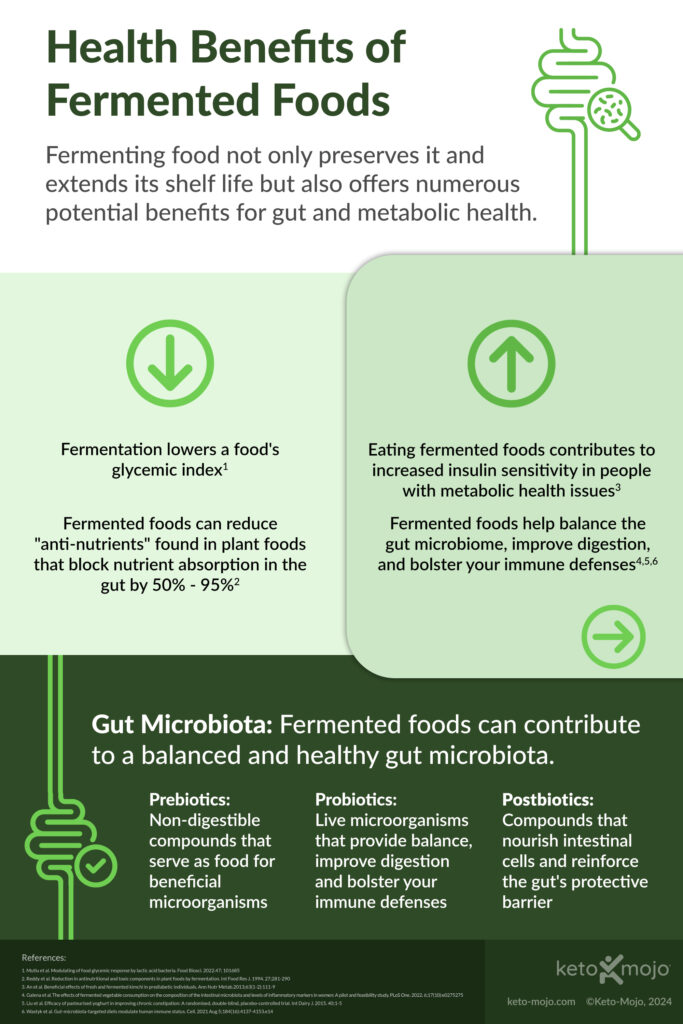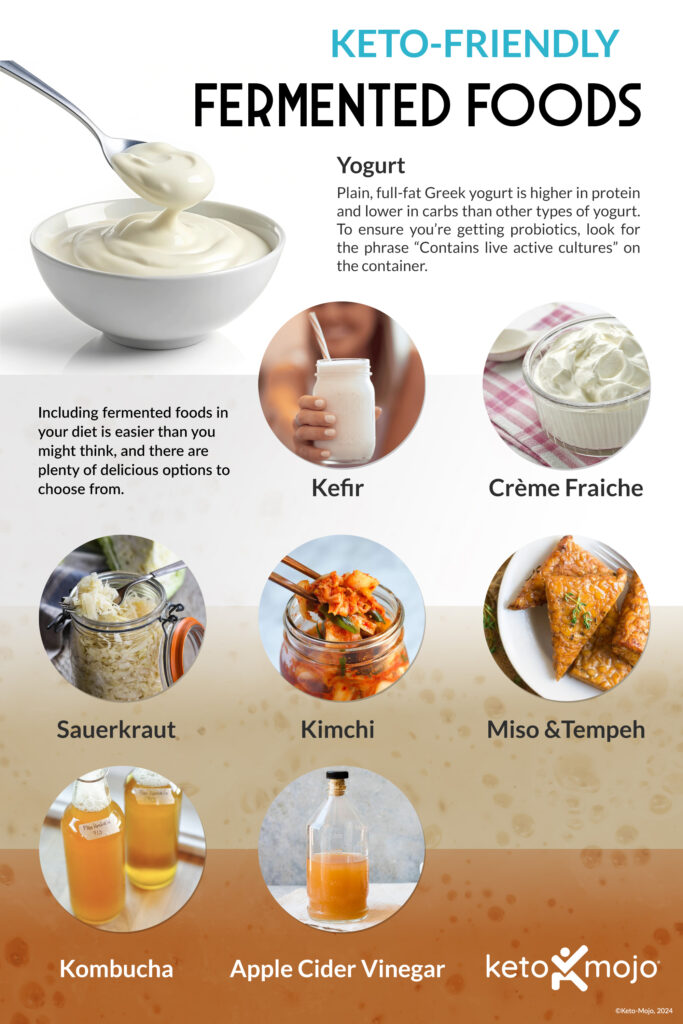In recent years, there’s been growing interest in fermented foods among many health-conscious people. These culinary staples have been cherished across cultures for centuries, and modern science is now showing their impressive health benefits. But what exactly are fermented foods, why are they so beneficial, and how can you easily incorporate them into your keto diet? Keep reading to find out.
What Are Fermented Foods?
Fermentation is a natural process in which microorganisms like bacteria and yeast transform sugars and starches into alcohol, gases, or acids. For example, when making yogurt and kefir, lactose (milk sugar) is converted into lactic acid.
Fermented foods can generally be divided into two categories based on how the fermentation process is initiated.
- Wild fermentation: The microorganisms responsible for fermentation are naturally present in the food.
- Examples:
- Sauerkraut: Cabbage is shredded and salted, and the lactic acid bacteria naturally present on the cabbage leaves initiate the fermentation process.
- Kimchi: Various vegetables are mixed with seasonings and left to ferment with the wild microorganisms present.
- Sourdough Bread: The dough is fermented using wild yeast and bacteria naturally present in the flour and environment.
- Examples:
- Fermentation with starters: Specific strains of microorganisms (yeast, bacteria, or molds) are added to the food to initiate and control the fermentation process.
- Examples:
- Yogurt: The fermentation of milk is initiated by adding specific strains of bacteria, usually Lactobacillus bulgaricusand Streptococcus thermophilus.
- Cheese: Specific bacterial and fungal cultures are added to milk to produce a wide variety of cheeses.
- Beer and wine: Specific strains of yeast are added to ferment the sugars in grains or grapes.

Fermenting food not only preserves it and extends its shelf life but also offers numerous potential benefits for gut and metabolic health:
- Blood glucose and insulin regulation: Fermentation lowers a food’s glycemic index, partly because some of the sugar or starch is converted into other compounds during the process. Some studies suggest that consuming fermented foods may help control blood sugar levels and increase insulin sensitivity in people with metabolic health issues. In a large review of randomized clinical trials, consuming fermented foods was found to improve blood glucose control, insulin levels, and other health markers in adults with type 2 diabetes or prediabetes.
- Gut microbiota: Many fermented foods contain prebiotics, probiotics, and postbiotics that beneficially influence the composition of the gut microbiome:
- Prebiotics are non-digestible compounds that serve as food for beneficial microorganisms (probiotics).
- Probiotics are health-promoting bacteria that are naturally found in fermented foods. These bacteria may help balance the gut microbiome, improve digestion, and bolster your immune defenses.
- Postbiotics are bioactive compounds produced by probiotics during fermentation, including short-chain fatty acids (SCFAs). (Note: SCFAs can also be produced when probiotics in the gut feed on prebiotic fiber that’s found in food). These SCFAs provide nourishment for the cells that line the intestines, reinforce the gut’s protective barrier, and support the immune system. Growing research suggests SCFA may also be beneficial for body weight regulation and improving insulin sensitivity.
- Nutrient absorption and metabolism: Fermented foods can improve your body’s absorption of essential nutrients by reducing “anti-nutrients” found in plant foods. These anti-nutrients are compounds that bind to minerals like calcium and iron in your digestive tract, hindering their absorption. Common types include phytic acid, oxalates, and lectins. Decades ago, researchers discovered that fermenting foods could reduce their anti-nutrient content by 50-95%. For this reason, consuming fermented foods can be particularly beneficial for individuals on plant-based diets, whose main protein sources–– legumes, nuts, and seeds––are high in anti-nutrients.
Sources of Keto-Friendly Fermented Foods
Including fermented foods in your diet is easier than you might think, and there are plenty of delicious options to choose from:

- Yogurt: Plain, full-fat Greek yogurt is higher in protein and lower in carbs than other types of yogurt. To ensure you’re getting probiotics, look for the phrase “Contains live active cultures” on the container.
- Kefir: As a fermented dairy beverage, kefir offers a tangy taste that’s similar to yogurt. Choose unflavored varieties.
- Crème fraiche: Similar to sour cream but higher in fat, this rich, tart dairy product is made by fermenting heavy cream with a bacterial culture.
- Sauerkraut: This fermented cabbage has a pungent flavor and is rich in fiber.
- Kimchi: A staple in Korean cuisine, this spicy fermented vegetable dish provides fiber and a crunchy texture.
- Kombucha: A fizzy, fermented tea, unsweetened kombucha is not only refreshing but also healthy.
- Miso and tempeh: These fermented soy foods provide a great source of easily digested plant-based protein for vegetarians and vegans.
- Apple cider vinegar: Unflavored vinegar is carb-free and rich in the SCFA acetate. However, because it’s highly acidic, it should only be used in small amounts.
Do you need to consume these foods raw or uncooked to get their benefits? It’s not entirely clear. However, it’s generally accepted that heating most types of probiotic bacteria above 140 degrees Fahrenheit (60 degrees Celsius) kills them. Therefore, consuming fermented foods in their uncooked state is best for maximizing probiotic activity. However, research suggests that probiotic bacteria that have been killed may still provide some benefits. A review of 40 randomized trials found that heat-treated probiotics were nearly as effective in preventing or treating disease as live probiotics. So, including both raw and cooked fermented foods in your diet could be a winning strategy.
How to Include Fermented Foods in Your Diet
Adding fermented foods to your diet can be both enjoyable and simple:
- Start small: If you’re new to fermented foods, start with small amounts to allow your body (and tastebuds) to adjust. A small glass of kombucha is a great way to begin. Another option is our Reuben Chaffles, which contain sauerkraut.
- Mix it up: Once you’ve sampled a few fermented foods, try to include a variety of them in your diet to get a diverse range of probiotics and nutrients.
- Pair with meals: Add kimchi or sauerkraut as a side dish to your meals, or use Greek yogurt as a base for smoothies and dressings.
- Add vinegar to your water: Consume up to 1 tablespoon of apple cider vinegar or other unflavored vinegar in water once a day. Diluting vinegar with water can help protect your tooth enamel.
- Experiment in the kitchen: Try making your own fermented foods at home using keto-friendly vegetables. It’s a fun way to explore new flavors and reap the health benefits.
Summary
Fermented foods are a time-tested cornerstone of traditional nutrition. By incorporating these foods into your diet, you can nourish and protect your gut, potentially improve your metabolic health, and support your immune system. You may also find that they add richness and diversity to your keto lifestyle.


